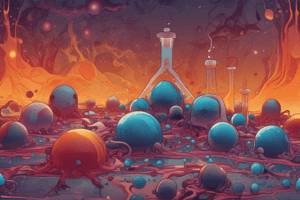Podcast
Questions and Answers
Explain why copper oxide is considered a base, even though it doesn't dissolve in water to form an alkali.
Explain why copper oxide is considered a base, even though it doesn't dissolve in water to form an alkali.
Copper oxide is considered a base because it can react with acids and neutralize them, even though it is insoluble in water.
How does the reaction of metals with oxygen differ from the reaction of non-metals with oxygen in terms of the products formed when these oxides dissolve in water?
How does the reaction of metals with oxygen differ from the reaction of non-metals with oxygen in terms of the products formed when these oxides dissolve in water?
Metal oxides typically form bases or alkalis when dissolved in water, whereas non-metal oxides form acids when dissolved in water.
Describe the product formed when copper is heated in air and explain the type of chemical reaction that occurs.
Describe the product formed when copper is heated in air and explain the type of chemical reaction that occurs.
Heating copper in air results in the formation of copper oxide, a black powder. This is a type of oxidation reaction.
Give examples of metal oxides that dissolve in water and what do they form when dissolved?
Give examples of metal oxides that dissolve in water and what do they form when dissolved?
What are the products of the reaction between copper oxide and sulfuric acid?
What are the products of the reaction between copper oxide and sulfuric acid?
What type of substance is formed when a non-metal oxide dissolves in water?
What type of substance is formed when a non-metal oxide dissolves in water?
If sulfur reacts with oxygen, what type of substance is formed, and would you expect it to be acidic or basic when dissolved in water?
If sulfur reacts with oxygen, what type of substance is formed, and would you expect it to be acidic or basic when dissolved in water?
Define what is meant by the term 'base' in the context of chemical reactions.
Define what is meant by the term 'base' in the context of chemical reactions.
Compare and contrast the solubility of metal oxides and non-metal oxides.
Compare and contrast the solubility of metal oxides and non-metal oxides.
Explain the role of oxygen in the formation of both metal oxides and non-metal oxides.
Explain the role of oxygen in the formation of both metal oxides and non-metal oxides.
Predict whether nitrogen dioxide ($NO_2$) would form an acidic or basic solution when dissolved in water, and justify your answer.
Predict whether nitrogen dioxide ($NO_2$) would form an acidic or basic solution when dissolved in water, and justify your answer.
Explain, using examples from the text, how the behavior of oxides differs based on whether they are formed from metals or nonmetals.
Explain, using examples from the text, how the behavior of oxides differs based on whether they are formed from metals or nonmetals.
Describe, in terms of electron transfer, what happens when copper reacts with oxygen to form copper oxide.
Describe, in terms of electron transfer, what happens when copper reacts with oxygen to form copper oxide.
Explain how the reaction between copper oxide and sulfuric acid demonstrates the properties of a base.
Explain how the reaction between copper oxide and sulfuric acid demonstrates the properties of a base.
Compare the general formulas for the reaction of a metal with oxygen and a non-metal with oxygen.
Compare the general formulas for the reaction of a metal with oxygen and a non-metal with oxygen.
If you had to dispose of some sulfuric acid, would you use copper oxide or sulfur dioxide to neutralize it? Explain your choice.
If you had to dispose of some sulfuric acid, would you use copper oxide or sulfur dioxide to neutralize it? Explain your choice.
How does the dissolving of sodium oxide in water differ chemically from the dissolving of copper oxide in sulfuric acid?
How does the dissolving of sodium oxide in water differ chemically from the dissolving of copper oxide in sulfuric acid?
Describe the visual change that occurs when copper is heated in air, and what causes this change.
Describe the visual change that occurs when copper is heated in air, and what causes this change.
Explain how you could experimentally determine whether an unknown oxide is a metal oxide or a non-metal oxide, based on its behavior in water.
Explain how you could experimentally determine whether an unknown oxide is a metal oxide or a non-metal oxide, based on its behavior in water.
Flashcards
Copper Oxide
Copper Oxide
Black powder formed when copper reacts with oxygen when heated strongly.
Base
Base
Substance that reacts with an acid and neutralizes it.
Alkalis
Alkalis
Bases that dissolve in water.
Non-metal oxide
Non-metal oxide
Signup and view all the flashcards
Acids (from non-metal oxides)
Acids (from non-metal oxides)
Signup and view all the flashcards
Study Notes
- Copper reacts with oxygen when heated strongly in air, resulting in the formation of black powder copper oxide.
- Metal oxides are called bases.
- A base neutralizes acids through chemical reactions.
- Metal oxides like sodium and calcium oxide dissolve in water to form alkalis, thereby acting as bases.
- Copper oxide, a metal oxide, does not dissolve in water
- Copper oxides still react with acids and neutralize them.
- Copper oxide reacts with sulfuric acid to produce copper sulfate and water.
Reaction of non-metals with oxygen
- Non-metals react with oxygen to form oxides.
- Most oxides of non-metals are water-soluble
- Oxides of non-metals dissolve in water to produce acids.
- Sulfur, a non-metallic element, is a yellow crystalline solid.
Studying That Suits You
Use AI to generate personalized quizzes and flashcards to suit your learning preferences.




